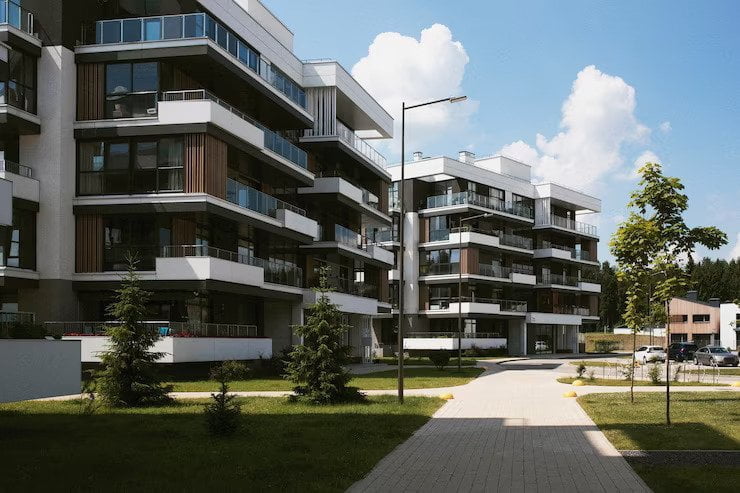A Beginner’s Guide On How To Invest In An Apartment Complex
by Arnab Dey Real Estate Published on: 29 March 2023 Last Updated on: 26 September 2023

Investing in an apartment complex can be a great way to diversify your investment portfolio and generate steady income over the long term.
Unlike other forms of real estate investment, apartment complexes offer the potential for multiple income streams, including rental income and potential appreciation in property value. You can get started in various ways- invest in a syndication, go for crowdfunding, REITs, etc.
However, investing in an apartment complex is a complex process that requires careful planning, research, and financial management. In this blog post, we’ll provide a beginner’s guide to investing in an apartment complex, covering the key steps involved in the process.
Whether you’re a seasoned real estate investor or new to real estate investing, this guide will provide valuable insights and practical tips to help you make smart investment decisions and achieve long-term financial success.
How Can Investing In An Apartment Complex Help You

Investing in an apartment complex can offer several benefits, including:
- Stable Cash Flow: Investing in an apartment complex can provide a steady stream of rental income to help you generate passive income and build long-term wealth.
- Potential for Appreciation: Apartment complexes can also appreciate in value over time, allowing you to build equity and potentially sell the property for a profit in the future.
- Diversification: Investing in an apartment complex can help diversify your investment portfolio and reduce your exposure to market volatility.
- Tax Benefits: Real estate investments, including apartment complexes, offer several tax benefits, including depreciation deductions, mortgage interest deductions, and the ability to defer capital gains taxes through 1031 exchanges.
- Control Over Your Investment: Investing in an apartment complex gives you more control over your investment than other investments, such as stocks or mutual funds. You can make decisions about property management, renovations, and other factors that can impact the value and profitability of the investment.
- Social Impact: Investing in an apartment complex can also have a positive social impact by providing tenants with safe, affordable housing and helping revitalize communities.
Overall, investing in an apartment complex can be a smart financial move that offers a range of benefits, from stable cash flow to long-term appreciation potential. However, it’s important to carefully evaluate potential risks and returns and develop a solid financial plan before investing.
Ways To Invest In An Apartment Complex
There are several ways to invest in an apartment complex, each with advantages and disadvantages.
Here are some of the most common methods of investing in apartment complexes:
- Direct Ownership: One way to invest in an apartment complex is to purchase the property outright and manage it yourself or with the help of a property management company. This approach offers the most control over the investment and the potential for the highest returns but also comes with the most responsibilities and risks.
- Real Estate Investment Trusts (REITs): REITs are investment vehicles that pool the capital of multiple investors to purchase and manage income-generating real estate assets, including apartment complexes. REITs typically offer regular dividends to investors but come with less control over the investment and may have higher fees.
- Private Equity Funds: Private equity funds are investment vehicles that pool the capital of accredited investors to make direct investments in real estate assets, including apartment complexes. Private equity funds typically offer high potential returns but come with higher risk and may require a significant minimum investment.
- Syndications: Syndications are investment structures where investors pool their capital to purchase an apartment complex. The investors share in the profits and losses of the investment, with a syndicator or sponsor managing the property. Syndications offer lower minimum investments than private equity funds and more control than REITs but also have a higher risk.
- Crowdfunding: Crowdfunding platforms allow multiple investors to contribute smaller amounts of capital to fund a larger investment in an apartment complex. This approach offers lower minimum investments and greater accessibility but comes with less control over the investment and higher fees.
Each of these methods of investing in an apartment complex has its own advantages and disadvantages, and it’s important to consider your investment goals, risk tolerance, and financial situation before deciding which approach is right for you.
How To Invest In An Apartment Complex

Investing in an apartment complex can be complicated and challenging, but by following these steps, you can develop a solid investment plan and maximize your chances of success.
Step 1: Determine your investment goals and budget
Before investing in an apartment complex, it’s important to determine your investment goals and budget. Consider factors such as your desired rate of return, your level of risk tolerance, and the amount of capital you have available to invest.
Step 2: Conduct market research
Conduct thorough market research to identify potential areas and properties to invest in. Analyze local real estate market conditions, supply, and demand for rental properties, demographic data, and economic and political factors that could affect the investment.
Step 3: Evaluate potential properties
Evaluate potential properties based on factors such as location, property size, rental income potential, vacancy rates, and potential repairs or renovations needed. Conduct a thorough property inspection to identify any issues that could impact the value or profitability of the investment.
Step 4: Develop a solid financial plan
Develop a solid financial plan with a budget for purchase, renovations, and ongoing property management. Evaluate potential financing options, such as traditional mortgages or commercial loans, and develop a strategy for managing the property’s cash flow and expenses.
Step 5: Conduct due diligence
Conduct thorough due diligence to ensure that all the investment’s legal, financial, and environmental aspects are in order. This may include reviewing property tax records, title documents, zoning laws, and environmental assessments.
Step 6: Close the deal
Once you’ve identified a suitable property and developed a solid investment plan, closing the deal is time. This involves finalizing the purchase agreement, securing financing, and transferring property ownership.
Step 7: Manage the property
After closing the deal, managing the property to maximize its potential returns effectively is important. This may involve hiring a property management company, developing marketing strategies to attract tenants, and implementing ongoing maintenance and repair plans.
By following these steps and staying informed about market conditions and trends, you can make informed investment decisions and maximize the potential returns of your apartment complex investment.
Conclusion
Investing in an apartment complex can offer a range of benefits, including stable cash flow, potential appreciation, and tax benefits. However, it’s important to conduct thorough market research, develop a solid financial plan, and conduct due diligence to minimize potential risks and maximize potential returns.
Seeking professional advice from real estate agents, attorneys, and financial advisors can also be beneficial. By taking a careful and informed approach to apartment complex investing, you can build long-term wealth and achieve your investment goals.
FAQ
Is investing in an apartment complex a good idea for beginners?
Investing in an apartment complex can be a complex and challenging process, and may not be the best choice for beginners. It’s important to have a solid understanding of the real estate market, financial planning, and property management before making such an investment. Seeking professional advice and conducting thorough research can help minimize risks and maximize potential returns.
How much capital do I need to invest in an apartment complex?
The amount of capital required to invest in an apartment complex can vary widely depending on factors such as the property’s location, size, and condition. It’s important to develop a solid financial plan that includes a budget for purchases, renovations, and ongoing management expenses. Potential financing options, such as traditional mortgages or commercial loans, should also be evaluated.
What are the potential risks of investing in an apartment complex?
Investing in an apartment complex can involve risks such as tenant turnover, vacancy rates, property damage, and market fluctuations. It’s important to conduct thorough due diligence and develop a solid financial plan to minimize these risks. Insurance and legal protections should also be considered.
Read Also:



































































































